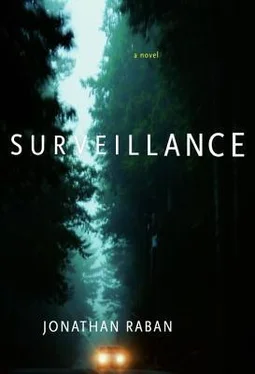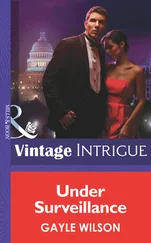He laughed, an arid little chuckle. “When we saw what we saw in Lodz, it looked like they were doing it for the hundredth time. It had that practiced air. Makes me think of the Ik. You know the Ik?”
“I don’t think so.”
“Tribe in Africa — Uganda, Sudan, somewhere up there. The Ik lost their hunting grounds; then they had a go at being farmers, which they were no damn good at at all. When they hit starvation point, they figured the only way to save the economy was to get rid of their old people. It’s a tough assignment in any language to kill off your own close kinfolks, so the Ik had to ritualize it, turn it into a kind of elaborate game. They pushed their grannies off the top of cliffs like it was some Olympic event, you know, Tossing the Granny.
“Two years plus into the war — by the end of ’41, beginning of ’42—the Nazis were behaving pretty much like the Ik, like a barbarized people. They could do the unconscionable because they’d worked it up into a whole series of rituals. Oh, hey there! How ya doin’?”
Alida had stepped into the room. Barefoot, hair a blond tangle, in shorts and baggy T, she was carrying a plastic bag and looked more eight than eleven.
“Oh my God,” she said, “I’ve got so many sand dollars it’s obscene.”
To Lucy, Augie said, “I need sand dollars for my research, so I commissioned Alida. We had a deal: a dollar per dollar, if that’s okay with you.”
“Sure.”
“So what’s the score, Alida?”
“Forty-seven.”
“Lay ’em out on the floor there. Let’s count them.”
Alida unpacked her trove of sandy skeletons. Augie, down on his knees, was talking nature study as if the Nazis had never existed, explaining cilia and pores and tube feet. “That one’s got a nick in it. Doesn’t qualify. Let’s break it open. See those little hard white pieces inside? Sand-dollar teeth.”
“Cool.”
“What do you think it eats?”
“I don’t know. Plankton?”
“Right. Juicy little plankters. Uses its tube feet to shovel its food into its mouth here, then sifts it through its teeth.”
Three sand dollars were rejected as unfit for research purposes, so Augie got out his wallet and paid off his assistant with $44.00. Alida stowed away the loot in the buttoned back pocket of her shorts. Grinning at her mother like the cat that got the cream, she said, “I think the tide’s coming in quite fast now.”
Augie looked at his watch. “Mid-tide should be about eleven-fifty, then we can think about getting the kayaks out.”
“Have you had breakfast yet, Rabbit?”
“Yes, Augie cooked me scrambled eggs.”
“With some expert assistance. She’s a better cook than I am, I’m afraid.”
“You’d better put that money away before you go kayaking,” Lucy said, hearing in her voice the annoying note of the parent trying to repossess her child.
At nine Minna showed up, looking particularly busty and skinny-legged this morning, dressed as if for a picnic in a knee-length skirt and a tight white angora sweater — hardly the same person as the faded woman in a housecoat who’d met Lucy at the door earlier in the week.
Alone with Lucy in the kitchen, she said, “I have to go into Langley to pick up some things.” Clearly an invitation.
“Can I drive you there?”
“Oh, in your sports car? That’d be such a treat. Driving our Corolla’s a drag.”
So that was what lay hidden behind the doors of the three-car garage. Lucy had expected something grander.
“We can have some girl talk,” Minna said over the gruff snarl of the coffee grinder.
“I THINK I’m going to throw up into the fucking aspidistra.”
“Asphodel, Tad, asphodel.”
“Whatever. ‘It’s my allergies, you know, honey.’”
“Just swallow it, and we’ll break after this take, okay? Silence on set!”
“Rolling.”
“MagiGro 9, take 7.”
“Now is the season…” Tad sometimes bought free-range eggs from an old man with a little truck farm on the Snoqualmie River, and it was his voice — an old-West tobacco-chawing burr — that Tad borrowed for the MagiGro commercials. “Now is the season when all our thoughts turn to planting out our prettiest summer annuals…”
He hated these MagiGro things.
SETTLING HERSELF into the crimson leather of the top-down Spider, Minna said, “This is nice. It reminds me.”
“Of what, Minna?”
“Oh, you know…just memories.”
Driving coast to coast across the narrow island took only a few minutes. As she crossed the central highway, Lucy looked right, up the hill to where the accident had happened, half expecting to see again the play of red, white, and blue lights among the firs. Safely past that hurdle, she relaxed, enjoying the twisty road that snaked through fields and clumps of woodland. Accelerating hard out of a bend, she said, “Sorry, is this too fast for you?”
“I like fast,” Minna said.
But in the store at Langley, she was one of the slowest shoppers Lucy had ever seen. Expertly, fastidiously, she sniffed and fingered her way through the produce department. Spinach was rejected as tired, apples as old, celery as spent. She paused for a while over a box of early, expensive Mexican peaches and held one up to Lucy’s nose. “They don’t smell peachy yet to me.”
“Me neither.”
A mango narrowly passed muster; a papaya failed the test. Getting into Minna’s shopping basket was like Harvard entrance for fruits and vegetables: many were called but few were chosen. When Minna, trailed by Lucy, at last reached the checkout with her scanty haul, they were patronized by the boy behind the till.
“Find everything you want, ladies?” Lucy saw that she and Minna were perfectly invisible to him — two old bats on whom to give his charms the lightest of workouts. “Are we enjoying the nice weather?”
Disappointingly, Minna swallowed the bait, explaining that Lucy and her daughter were visiting and that her husband was taking Alida kayaking, that…
“Oh, cool!” the boy said, in Alida’s not-listening tone. To his “Have a nice day, ladies!” Lucy wanted to steal Joan Didion’s riposte and say “I have other plans.”
Crossing the parking lot, Minna said, “I do like the people at the Star Store — they’re all so friendly.”
Poor Minna: was it for the boy at the checkout that she’d dressed to kill?
Knowing the answer to the question, Lucy asked, “Do you know many people on the island?”
“Oh, no, hardly a soul. There’s another retired professor and his wife, but they live in Coupeville and neither of us like to drive at night, so we don’t see too much of them. Augie calls him the Liberal Revisionist: they’re not really friends.”
They left Langley on a different road, with Minna giving directions. As they passed the county fairgrounds, Lucy said, “When you first knew Augie, did he talk much about his past?”
“Oh, yes. He talked a lot about Ann Arbor, where he’d been in grad school, and Binghamton, where he was in college. And Schenectady — he was in high school in Schenectady. We were always talking then.”
“But Europe and everything that happened to him there — did he talk about that?”
“Not really. Of course, I knew his mom and dad had passed. I got the idea they must have been killed in the camps over there, but it wasn’t something he ever spoke about directly. After all he’d been through, I think he just wanted to forget, and talking about it would’ve brought it back. I remember him telling me about the day he arrived in New York City — he was nine then — and being amazed by the skyscrapers, and the lady from Latvia who took him to Macy’s, and this fountain they had in the store. It was like his whole memory began that day, and everything that happened before was kind of dead to him. I’d see stuff on the news about Berlin and say ‘You’ve been there, Augie,’ and he’d nod and say yeah — and that was all he ever said. Yeah. He was bottling it up inside himself and wasn’t saying nothing to nobody.”
Читать дальше












